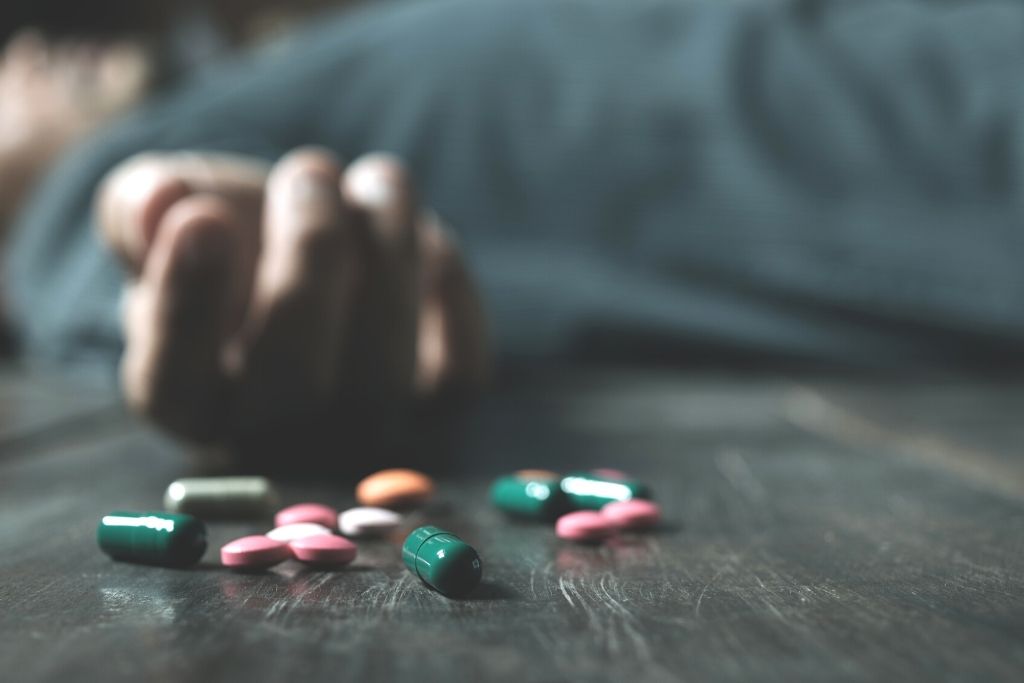What is Valium?
Valium, a brand-name version of diazepam, is one of the most abused prescription drugs in the United States. Valium is a benzodiazepine medication that is typically prescribed for anxiety treatment or to ease alcohol withdrawal symptoms. It’s also a central nervous system (CNS) depressant that’s used for its sedative, hypnotic, and anti-anxiety effects.
As a depressant, Valium suppresses excitability in the nervous system. It accomplishes this goal by affecting a brain chemical called gamma-aminobutyric acid (GABA), which binds to GABA receptors and regulates excitement.
However, people with insomnia (sleep disorder) and anxiety disorders may have issues with a chemical balance, which Valium can correct in the short term. But if it’s used for longer than prescribed, it can lead to valium addiction, overdose, and withdrawal.

According to the National Institute on Drug Abuse (NIDA) [1], Valium works to slow down the brain’s activity, and when a user stops taking it, there can be a rebound effect. If a user were prescribed Valium to treat anxiety or insomnia, the rebound effect could cause these symptoms to return with increased intensity, lasting anywhere from days to weeks.
In some cases, Valium is used off-label to sedate individuals who have been admitted to intensive care units. Nonmedical users take Valium to experience its pleasurable effects. Because Valium slows down the nervous system, it can produce a sense of euphoria. It also relieves anxiety, which makes it an attractive option for users who want to escape from the stress of their lives.
Long-term use of Valium increases the risk for dependence. It also makes it likely that a nonmedical user will experience adverse side effects. These side effects include muscle weakness, uncontrollable shaking, loss of control over body coordination, slowed heartbeat, and slowed breathing.

Get Your Life Back
Find Hope & Recovery. Get Safe Comfortable Detox, Addiction Rehab & Mental Health Dual Diagnosis High-Quality Care at the We Level Up Treatment Centers Network.
Hotline (877) 378-4154What is Valium Used For?
Medical professionals prescribe drugs every day for numerous reasons. Some people are just coming out of surgery or have chronic pain and are prescribed painkillers so they can function and be comfortable in their daily lives. Also, many of us feel symptoms of anxiety from time to time. However, anxiety and all of its uncomfortable symptoms are a daily occurrence for some individuals. Ongoing anxiety can affect your ability to function at home, school, and work [2]. Treating anxiety often involves talk therapy and antidepressant medications. Benzodiazepines, such as Valium, are another class of drugs used to help relieve anxiety.
When it comes to treating anxiety, it often involves some therapy and antidepressant medications. One of the most commonly prescribed benzodiazepines or benzos is Valium. In addition to anxiety, Valium also treats several other conditions, including:
- Acute alcohol withdrawal
- Seizure disorders
- Skeletal muscle spasm
- Chronic sleep disorder
It is one of many medications prescribed short term for the treatment of anxiety. The reason for the short-term use is because, after a few weeks, most individuals will develop a physical dependence. It doesn’t matter if you were taking the prescription as directed, there is a high possibility that once you stop taking the drug, you will begin to have some form of valium withdrawal after a few hours or days.
Over time, it is harder for a Valium abuser’s brain to function normally without the drug. Even though, some individuals addicted to Valium may not even realize they have a problem. Taking Valium for longer than four to six weeks, even with a prescription from a physician, increases the likelihood of becoming dependent on the drug and most likely to experience valium addiction.
Get Help. Get Better. Get Your Life Back.
Searching for Accredited Drug & Alcohol Rehab Centers Near You? Or Mental Health Support?
Even if you have failed previously, relapsed, or are in a difficult crisis, we stand ready to support you. Our trusted behavioral health specialists will not give up on you. Call us when you feel ready or want someone to speak to about therapy alternatives to change your life. Even if we cannot assist you, we will lead you wherever you can get support. There is no obligation. Call our hotline today.
FREE Addiction Hotline – Call 24/7Valium for Sleep
Insomnia is a sleeping disorder that causes difficulty in falling asleep. People suffering from insomnia can also suffer from weakness and blurred thinking, Types of insomnia include primary insomnia and secondary insomnia which have varying effects on different people.

Two of the most commonly prescribed tablets, Xanax and Valium are not designed to aid with sleep; instead, they are used to treat anxiety-related sleep disorders. Since they are benzodiazepines, they also have sedative effects and as such may induce drowsiness and help someone get to sleep.
Valium can be taken by mouth, injection, or rectal gel. When administered via injection, valium takes just one to five minutes to take effect [3]. Diazepam relieves feelings of anxiety and agitation. With sleeping problems, diazepam decreases the time it takes to fall asleep and the number of times you wake during the night, as well as increases the total amount of time spent sleeping.
Using Valium (Diazepam) for insomnia can be effective in the short term but there are many possible adverse effects for this type of medication, such as Valium addiction, withdrawal symptoms, daytime drowsiness, or feeling sleepy or tired.
Valium for Anxiety
Valium impacts gamma-aminobutyric acid (GABA) receptors. GABA is a neurotransmitter in the brain that is connected to the regulation of sleep, relaxation, and anxiety. When influencing the GABA receptors, Valium slows down the central nervous system (CNS).
This action decreases your feelings of nervousness and agitation and produces a sense of calm and relaxation. In this way, Valium also helps lessen the intensity of panic attacks and other anxiety symptoms.
Valium is a fast-acting medication that quickly helps lower anxiety and other symptoms of panic disorder. Valium gets into your system rapidly, but can also build up over time, which can sometimes make it challenging to find the most effective and safe dose of Valium.
Prolonged use of Valium, a central nervous system (CNS) depressant, leads to an increase in tolerance, causing a user to take more, which increases their chance of valium addiction. Moreover, someone with a history of alcohol or drug abuse may be at risk for valium addiction.
Valium for Pain
Irritable bowel syndrome (also known as IBS) is a relatively common chronic health condition affecting the large intestine (colon). IBS can cause patients to experience severe cramps, abdominal pain, diarrhea, gas, bloating, and constipation. An estimated 10-15% of the world population has some form of IBS, and roughly 2 out of 3 IBS sufferers are female. An IBS diagnosis can also lead to secondary health issues such as anxiety and depression.
Unlike some forms of inflammatory bowel disease (such as Crohn’s disease and ulcerative colitis), IBS does not raise the risk of colorectal cancer or affect the bowel tissue. Some people can successfully manage their IBS symptoms with a basic lifestyle change, such as diet and exercise. For more severe cases, however, medication may be needed, and in some instances, doctors recommend an anti-anxiety medication like Valium to treat IBS symptoms and any accompanying anxiety symptoms.
A growing number of people in the U.S. are taking anti-anxiety drugs like Valium and Xanax not just for anxiety or depression but also for chronic pain. These drugs are in a family of medicines known as benzodiazepines, including drugs like Ativan and Klonopin. The biggest surge was in prescriptions for back pain or other forms of chronic pain, which rose from 3.6 percent to 8.5 percent over the study period.
Benzodiazepines like Valium, are almost never a good alternative to opioids to treat pain. When they were first introduced, benzodiazepines were a huge improvement over their predecessor, barbiturates. There are very real benefits to Valium, particularly when prescribed for short-term and intermittent use.
Primary care physicians may increasingly prescribe benzodiazepines as a safer, more effective alternative to opioids, but there’s little evidence to support this. Individuals must be informed of and weigh the risks and benefits of using Valium, particularly if they are taking other medications that affect the central nervous system.
Valium Dosage
Warning: This drug can lead to valium addiction (dependency), especially when higher dosages are used over prolonged periods of time. In patients addicted to diazepam after prolonged use, abrupt discontinuation may cause symptoms of withdrawal.
- Diazepam may be taken with or without food.
- Diazepam is disposed of by the liver and excreted mainly by the kidney. Dosages of diazepam may need to be lowered in patients with abnormal kidney function.
- The usual oral diazepam dose for anxiety or seizures is 2-10 mg given 2-4 times daily.
- The usual rectal dose is 0.2-0.5 mg/kg and depends on the age of the patient.
Comfortable Facilities & Amenities
High-Quality Addiction & Mental Health Rehabilitation Treatment
Rehab Centers TourRenowned Addiction Centers. Serene Private Facilities. Inpatient rehab programs vary.
Addiction Helpline (877) 378-4154Proven recovery success experience, backed by a Team w/ History of:
15+
Years of Unified Experience
100s
5-Star Reviews Across Our Centers
10K
Recovery Success Stories Across Our Network
- Low Patient to Therapist Ratio
- Onsite Medical Detox Center
- Comprehensive Dual-Diagnosis Treatment
- Complimentary Family & Alumni Programs
- Coaching, Recovery & Personal Development Events
Signs of Valium Addiction
If you are looking for signs that someone is abusing Valium, here are the signs you would be looking for:
- Drowsiness
- Sedation
- Amnesia or memory problems
- Dizziness
- Muscle weakness
- Nausea
- Dilated eyes
- Vomiting
- Double vision
- Blurred vision
- Loss of interest in sex
A person struggling with Valium addiction and others who are particularly susceptible to its effects may show these signs:
- Confusion
- Hallucinations
- Loss of inhibitions
- Aggression
- Depression
- Thoughts of suicide or self-injury
- Hyperactivity
- Agitation
- Hostility
- Seizures
- Loss of bladder control
- Tremors
- Urine retention
Another sign of Valium addiction is that an individual may become a poor driver. He may weave in his lane and may have trouble focusing. His reaction time will probably be slower. Because of the sedating effect of the drug, the driver may not react appropriately to hazards on the road. Highway safety information indicates that Valium use may contribute to some traffic accidents. Use of Valium at night may still impair one’s ability to drive the next day.
A person struggling with Valium addiction may also suffer a loss of judgment as one of the effects of the drug. He could then possibly decide to mix Valium with alcohol or opiates, which could result in his death. Each of these drugs slows breathing and if it slows enough, the drug abuser will die.
Becoming “disinhibited” is a sign of Valium addiction. It means a person’s inhibitions are lowered. This can result in a person becoming aggressive and harming others or himself or engaging in risky activities like unprotected sex.
Once Valium addiction is present, withdrawal symptoms will appear if a person stops taking the drug. These Valium withdrawal symptoms can be severe or even life-threatening. Seizures and convulsions are possible if a person has not been tapered off the drug after heavy use. Many individuals will need a medically-assisted detox to help them break free from their Valium addictions safely.
Valium Addiction Symptoms
When a substance use disorder becomes an addiction, it’s characterized by compulsive drug use, despite serious consequences. For instance, someone who’s addicted to Valium will continue using it, even if it interferes with work or relationships.
Here are some of the most common symptoms of Valium addiction:
- Intoxication similar to drunkenness
- Slurred speech
- Memory issues
- Lethargy
- Apathy
- Concentration issues
- Isolation
- Strange sleep patterns
- Hiding drugs
- Lying about drug use
- Failing to stop, despite repeated attempts
- Depression
- Anxiety
- Recklessness
- Shopping for doctors

Valium Side Effects
Due to their effectiveness and relative safety, benzodiazepines are often prescribed to treat anxiety disorders and other conditions. However, all medications have side effects that you may or may not experience. Some of the most common side effects of Valium include:
- Confusion
- Dizziness and lightheadedness
- Drowsiness
- Fatigue
- Lack of coordination and unsteadiness
- Weakness
Most side effects should go away or lessen over time. Consult your doctor if side effects worsen or become unmanageable.
World-class, Accredited, 5-Star Reviewed, Effective Addiction & Mental Health Programs. Complete Behavioral Health Inpatient Rehab, Detox plus Co-occuring Disorders Therapy.
CALL (877) 378-4154End the Addiction Pain. End the Emotional Rollercoaster. Get Your Life Back. Start Drug, Alcohol & Dual Diagnosis Mental Health Treatment Now. Get Free No-obligation Guidance by Substance Abuse Specialists Who Understand Addiction & Mental Health Recovery & Know How to Help.
Why is Valium Addictive?
Part of the reason intoxicating substances are addictive is that, through other brain processes, they stimulate the reward system and release a surge of dopamine, serotonin, and norepinephrine – important neurotransmitters that elevate mood and energy.
Until recently, the method that benzodiazepines took to flood the brain with serotonin and dopamine was not well understood. However, in 2012, a group of medical researchers found that, through stimulating GABA, Valium prevents a group of neurons, called inhibitory interneurons, from halting dopamine production. When dopamine is allowed to be produced without restraint, this causes a surge of happiness, excitability, relaxation, and pleasure.
Valium Addiction Treatment
Addiction is a severe disease with no known cure, but it can be effectively treated, which leads to lifelong sobriety. Valium addiction treatment is a process that involves medical treatment and psychotherapy with the goal of long-term sobriety.
Your treatment plan has to be tailored to your individual needs to treat valium addiction effectively. To encourage personalized treatment, clinicians use the ASAM criteria to help determine the best level of care. The criteria include six dimensions that help clinicians assess the level of intensiveness they need. After you enter a program, you’ll sit down with a therapist to go through a biopsychosocial assessment and create a treatment plan. The evaluation will help your therapist better understand your biological, psychological, and social needs.
Inpatient Treatment
Medically-assisted detox is needed for Valium detox, and users should never attempt to detox from Valium without medical supervision. At a treatment facility, professional healthcare workers will perform a full mental and psychological evaluation of a client before beginning the process of weaning them off Valium. This has to be done carefully to avoid triggering the worst of the withdrawal symptoms. In addition, medical staff may administer anticonvulsant, anti-seizure, or antianxiety medications to ease the process.
In addition to medically-assisted detox, comprehensive therapy is needed to address the root reasons that led to Valium addiction in the first place. It is essential to learn how to process the mental and emotional damage done by Valium addiction. By doing so, they will be able to learn how to function in day-to-day life without reaching for a bottle of pills. The client and therapist will work together on formulating strategies to help the client deal with the temptation to use Valium and how to respond to the situations that give rise to those temptations.
Cognitive Behavioral Therapy (CBT) is a key tool in this stage of treatment, It works by examining the client’s thought and behavioral patterns, attempting to discern the processes that led to Valium addiction. Once these patterns are understood, a therapist can guide the client towards forming newer, healthier patterns that can be used as a defense against the threat of relapse [4]. Identifying and correcting harmful thought processes is the foundation of relapse prevention.
Once clients have completed this formalized inpatient drug treatment, it is necessary that they connect with a support group that can help them keep the principles of therapy fresh in mind. To this point, 12-Step groups and other aftercare programs give the client a network of peers who have been through similar experiences and speak the language of this stage of recovery. These peers are there if the client needs someone to talk to, and they can provide companionship and solidarity when saying “no” to Valium becomes a struggle.
If someone is addicted to Valium because of its intense and often dangerous Valium withdrawal symptoms, that person ought to consider inpatient detox. If you or a loved one is struggling with Valium addiction, We Level Up NJ addiction specialists are standing by to help.

Experience Transformative Recovery at the We Level Up Treatment Center.
See our authentic success stories. Get inspired. Get the help you deserve.



Start a New Life
Begin with a free call to an addiction & behavioral health treatment advisor. Learn more about our dual-diagnosis programs. The We Level Up treatment center network delivers various recovery programs at each treatment facility. Call to learn more.
- Personalized Care
- Caring Accountable Staff
- Comfortable Amenities
- Licensed & Accredited
- Renowned w/ 5-Star Reviews
We’ll Call You
Sources:
[1] NIDA – https://archives.drugabuse.gov/news-events/nida-notes/2012/04/well-known-mechanism-underlies-benzodiazepines-addictive-properties
[3] NIDA – https://archives.drugabuse.gov/publications/nida-community-drug-alert-bulletin-prescription-drugs/what-types-prescription-medications-are-commonly-abused
[4] SAMHSA – https://www.samhsa.gov/medication-assisted-treatment/medications-counseling-related-conditions/co-occurring-disorders